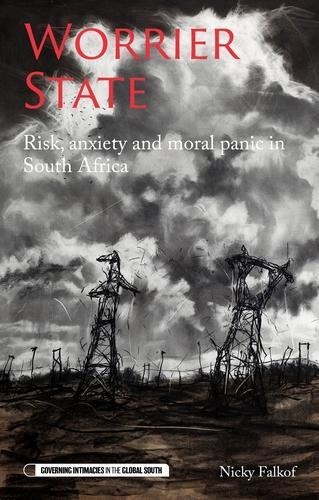
Worrier State: Risk, Anxiety and Moral Panic in South Africa
(Hardback)
Available Formats
Publishing Details
Worrier State: Risk, Anxiety and Moral Panic in South Africa
By (Author) Nicky Falkof
Manchester University Press
Manchester University Press
26th April 2022
United Kingdom
Classifications
Tertiary Education
Non Fiction
Sociology and anthropology
Media, entertainment, information and communication industries
152.460968
Physical Properties
Hardback
248
Width 138mm, Height 216mm, Spine 19mm
476g
Description
A wide-ranging investigation of cultures of fear in South Africa, this book reveals how fear and its various features manifest in contemporary media forms and the people they serve, and how these are impacted by race, class, gender, space and identity.
The book is intimately interested in the way in which moral panics, mass fears and collective anxieties manifest in circumstances of higher risk, heightened insecurity, deep inequality and accelerated social change.
Spanning a range of imagined communities and physical spaces, it investigates four case studies in which fear and anxiety manifest in radically different ways: the far right myth of white genocide; so-called Satanist murders of young women; an urban legend about township crime; and social theories about safety and goodness in the suburbs.
Reviews
This stunning book resonates with climates of fear far beyond South Africa in how it magnifies the tensions and intimacies between embodied experience and the lingering history and threat of violence. This is a powerful and difficult book to write, and to write this well.
Samantha Pinto, author of Infamous Bodies: Early Black Womens Celebrity and the Afterlives of Rights
Original and refreshing, Falkofs book is a must read for those of us interested in understanding contemporary formations of race and power in the global South and the role of the media in framing these debates. This study is critically needed in this moment of increasing worldwide white nationalism.
Xavier Livermon, author of Kwaito Bodies: Remastering Space and Subjectivity in Post-Apartheid South Africa
'Nicky Falkof has critically examined issues of race, gender, and identity vis-a-vis the affectual reactions of the media and individuals to the above-mentioned cases. These essays on white genocide, Satanist murders, township urban legends of plasma gangs, and suburban community groups are a brilliant representation of how the fear and feelings of anxiety and moral panic of the privileged cannot be equated to that of the powerless as it leads to severely reductionist and often false narratives by institutions such as the mass media.'
Sudatta Ghosh, South Asian University (SAU), Doing Sociology
Author Bio
Nicky Falkof is Associate Professor of Media Studies at the University of the Witwatersrand in Johannesburg
